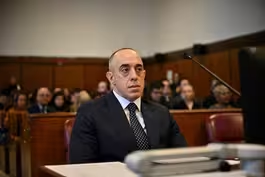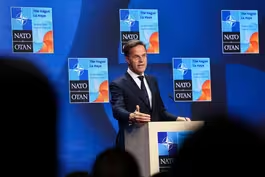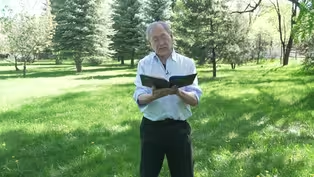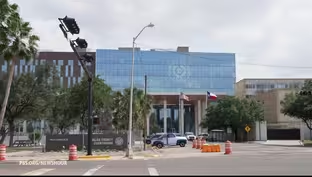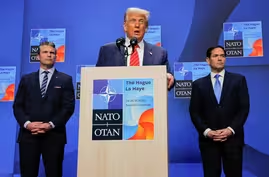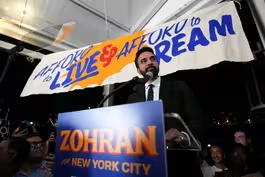
Jon Finer on aftermath and consequences of strikes on Iran
Clip: 6/25/2025 | 5m 19sVideo has Closed Captions
Jon Finer analyzes aftermath and potential consequences of U.S. strikes on Iran
To discuss the aftermath of the Israeli and U.S. strikes on Iran’s nuclear facilities and what the potential consequences of those attacks may be, Geoff Bennett spoke with Jon Finer. He was the deputy national security advisor during the Biden administration and is now a distinguished visiting fellow at Columbia University’s School of International and Public Affairs.
Problems playing video? | Closed Captioning Feedback
Problems playing video? | Closed Captioning Feedback
Major corporate funding for the PBS News Hour is provided by BDO, BNSF, Consumer Cellular, American Cruise Lines, and Raymond James. Funding for the PBS NewsHour Weekend is provided by...

Jon Finer on aftermath and consequences of strikes on Iran
Clip: 6/25/2025 | 5m 19sVideo has Closed Captions
To discuss the aftermath of the Israeli and U.S. strikes on Iran’s nuclear facilities and what the potential consequences of those attacks may be, Geoff Bennett spoke with Jon Finer. He was the deputy national security advisor during the Biden administration and is now a distinguished visiting fellow at Columbia University’s School of International and Public Affairs.
Problems playing video? | Closed Captioning Feedback
How to Watch PBS News Hour
PBS News Hour is available to stream on pbs.org and the free PBS App, available on iPhone, Apple TV, Android TV, Android smartphones, Amazon Fire TV, Amazon Fire Tablet, Roku, Samsung Smart TV, and Vizio.
Providing Support for PBS.org
Learn Moreabout PBS online sponsorshipGEOFF BENNETT: We turn now to the aftermath of the Israeli and U.S. strikes on Iran's nuclear facilities and what the potential consequences of those attacks might be.
Jon Finer was the deputy national security adviser during the Biden administration.
He's now a distinguished visiting fellow at Columbia University's School of International and Public Affairs.
Thanks for being here.
JON FINER, Former U.S.
Principal Deputy National Security Adviser: Good to be here, Geoff.
Thanks.
GEOFF BENNETT: So how do you interpret the way the administration is presenting the intelligence about the U.S. strikes?
Today, the CIA director put out a statement saying that the agency has credible evidence that Iran's nuclear program was severely damaged.
This is a day after the initial Defense Intelligence assessment that it was set back by a matter of months.
JON FINER: Look, Geoff, it's worth pausing just for a second on the extraordinary operation that our armed forces conducted in taking this strike.
We are fortunate in the United States to have the most capable military in the world.
We ask, Democratic administrations, Republican administrations, the impossible of them, and they deliver time and again.
And I have no reason to question that these planes did just as the administration reported, flew more than 30 hours from the United States, dropped their ordnance in a very small, very precise area, and hit the target.
The question now is, what actually is the impact of the strikes?
And here I think the administration has not done themselves any favors.
President Trump has had a degree of discomfort with the intelligence community going back to his first term, in part because I believe he likes to characterize the facts that frame a situation.
And so even before he took the strikes, he took issue with his director of national intelligence saying that Iran was not seeking a nuclear weapon, which has been the position of the intelligence community now going back at least 15 years.
And then, in the immediate aftermath of the strikes, he came out and said the targets were obliterated kind of minutes, it seemed, after the ordnance hit the target, before it was really possible, I think, to know what is called the bomb damage assessment, the assessment of what has actually happened.
Then the intelligence community put out information quietly, leaked it.
That drove us crazy when I was in the government.
I'm sure it drove this administration crazy -- suggesting maybe not as much damage had been done.
And then, today, you saw the administration put pushback very strongly, the president, the secretary of defense, as you said, the director of CIA.
So you now have the Trump administration seeming to be in an argument with itself about the outcome, which is not confidence-inspiring at a time when clarity is paramount.
GEOFF BENNETT: And this detail that the secretary of state, Marco Rubio, offered today, he said that Iran's nuclear capacity was effectively eliminated because the U.S. destroyed a key conversion facility, which is critical for producing bomb-grade uranium,from your vantage point, does that assessment hold up?
JON FINER: I think the key question is not, were some of these facilities destroyed?
The aboveground facilities, I think we never questioned whether we or another administration will be able to destroy them militarily if need be, Fordow, a harder assessment.
The real question is, how quickly could Iran, should it decide to do that, reconstitute these facilities?
Our assessment always was that they could do that relatively rapidly, that this was not a durable and permanent solution, or at least not as durable as a diplomatic solution, for exactly that reason.
And the other key problem right now is we just have a lot less insight into what is going on with Iran's nuclear program because the inspectors who only entered Iran because of international negotiations, because of a nuclear deal are no longer at these sites, no longer have visibility of Iran's nuclear stockpile and its enrichment facilities.
And so we are flying a bit blind.
GEOFF BENNETT: Could one of the unintended consequences of these strikes be that it only really accelerates Iran's nuclear ambitions?
JON FINER: Look, I think it would be reasonable and rational to conclude, if you are Iran -- and I hope this is not the path they go down, because I think it would be very dangerous for them and for the world - - that countries that have this capability, that have nuclear weapons don't get -- tend to get attacked in the way that they did.
But because that is a very real and rational possibility, it puts an even bigger premium now than there was a month ago on a diplomatic negotiation.
One of the things that's very interesting is, a lot has happened.
There's been a lot of sound and fury and military action over the last few weeks, but we remain in more or less the same strategic situation, in need of a diplomatic agreement to actually put shackles on this nuclear program.
And without that, we won't have it.
GEOFF BENNETT: On the matter of diplomacy, you helped draw up the 2015 Iran nuclear deal, the JCPOA, which President Trump withdrew the U.S. from.
He said that he could strike a better deal.
Today, he didn't appear very eager to reach an agreement with Iran.
What do you make of his approach at this current moment?
JON FINER: Well, look, I think whether or not he believes he has set the nuclear program back many years, which is the information they're now putting out today, there is a very good reason separate and apart from that to want a diplomatic deal.
And that is to get the inspectors back onto these sites.
I don't think Iran is going to allow that to happen absent some sort of diplomatic negotiation.
And without that, we will not know what their intentions are, except for whatever intelligence we're able to gather, which is good.
The Israelis have extraordinary intelligence penetration, as we have seen, into Iran, but it's never going to be perfect if you don't have physical presence at these sites, which you can only get through a negotiation.
GEOFF BENNETT: Jon Finer, thanks so much for joining us this evening.
We appreciate it.
JON FINER: Thanks again.
Judicial nominee faces scrutiny over Trump relationship
Video has Closed Captions
Clip: 6/25/2025 | 6m 26s | Trump judicial nominee faces scrutiny for willingness to defy court orders (6m 26s)
NATO secretary general on Trump, Ukraine and spending
Video has Closed Captions
Clip: 6/25/2025 | 5m 39s | NATO Secretary General Mark Rutte on Trump, Ukraine and new spending commitments (5m 39s)
Poet Arthur Sze on bridging Western and Chinese traditions
Video has Closed Captions
Clip: 6/25/2025 | 5m 57s | Acclaimed poet Arthur Sze on bridging Western and Chinese traditions (5m 57s)
Rio Grande Valley voters explain why the area shifted to GOP
Video has Closed Captions
Clip: 6/25/2025 | 8m 36s | Rio Grande Valley voters explain why the area shifted support to GOP in last election (8m 36s)
Senate committee hears Trump request to claw back funding
Video has Closed Captions
Clip: 6/25/2025 | 3m 29s | Senate committee hears White House request to claw back foreign aid, public media funding (3m 29s)
Trump insists U.S. 'obliterated' Iranian nuclear sites
Video has Closed Captions
Clip: 6/25/2025 | 5m 9s | Trump insists U.S. strikes 'obliterated' nuclear sites, says talks with Iran could resume (5m 9s)
What Mamdani's win in NYC means for Democrats nationwide
Video has Closed Captions
Clip: 6/25/2025 | 6m | What Zohran Mamdani's primary win in New York means for Democrats nationwide (6m)
Providing Support for PBS.org
Learn Moreabout PBS online sponsorship
- News and Public Affairs

FRONTLINE is investigative journalism that questions, explains and changes our world.

- News and Public Affairs

Amanpour and Company features conversations with leaders and decision makers.












Support for PBS provided by:
Major corporate funding for the PBS News Hour is provided by BDO, BNSF, Consumer Cellular, American Cruise Lines, and Raymond James. Funding for the PBS NewsHour Weekend is provided by...
